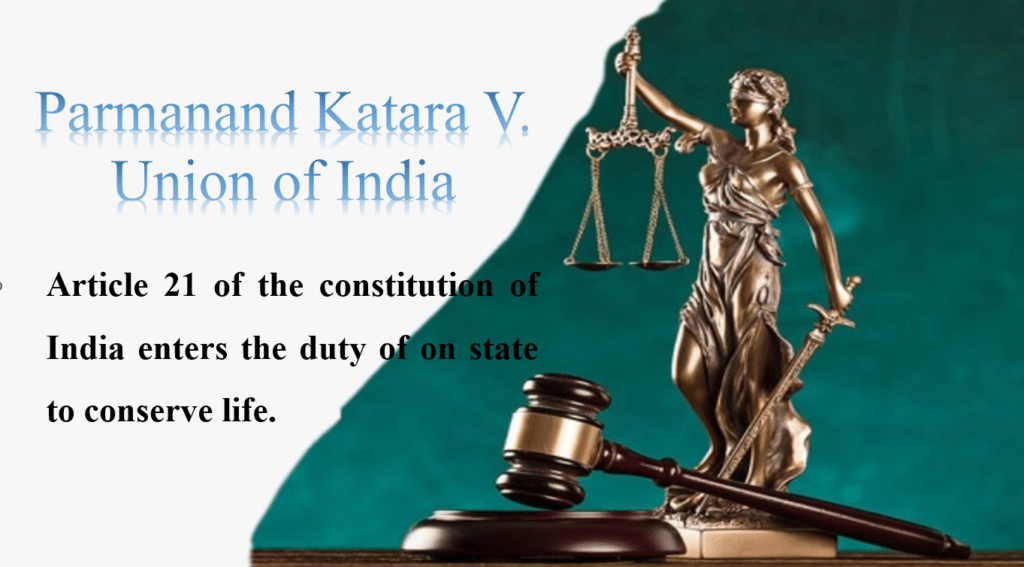Article 21 of the constitution of India enters the duty of on state to conserve life.

| CASE NAME: | Parmanand Katara V. Union of India |
| CITATION | 1989 AIR 2039, SCR (3) 997 |
| COURT | Supreme Court of India |
| CASE NO. | Writ Petition (Criminal) |
| CASE TYPE | Writ Petition (Criminal) |
| PETITIONER | Pandit Paramanand Katara |
| RESPONDENT | Union of India |
| BENCH | Justice Misra Rangnath |
| REFERRED | Regarding Health CareRegarding Emergency medical care in IndiaRegarding Article 21Regarding Article 32 |
Introduction:
This case has enlarged the scope and jurisprudence of emergency medical care in India.
This is the landmark case that pronounced judgment by the supreme court which mad is obligatory or compulsory for doctors or any healthcare professional both private or public to take immediate medical aid or attend victim who is injured in any kind of accident without any delay or any further process of any legal actions.
The Fact of Case:
. The Petitioner has filed under Article 32 of the constitution in the public interest by Pandit permanent Katara who claims himself to be a human rights activist.
. A motorcyclists accident happened and the doctor refused to give him treatment at the nearest hospital and refused to give treatment and to attend him and they said to take them to another hospital and he should take him to another hospital which is 20 km from the current hospital and between that he was being transported that person dies.
. So Parmanand Katara Human activists file a writ petition under article 32 of the constitution of India to give direction to the Union of India and the medical or the health care professionals cannot deny to attend the patient and give proper treatment to them and avoid the further process that the matter is related to police case or any legal matter rather focuses on the injured person.
Provisions:
The matter is related to Article 21 of the constitution of India which deals which the right to life and clause 12 and clause 13 of medical ethics,1970.
Issue raised:
- Whether a person is allowed to give treatment but the hospital or by healthcare professionals in accident cases that have legal formalities before the victim is rendered medical aid.
- The status of the medicolegal case was discussed.
Petitioner contention:
The petitioner Pandit Parmanand Katara has origin the direction to be issued to the Union of India that to take supervision the injured citizens who suffer any kind of accident and immediately attend the medical professionals and bring for treatment and action towards them and give treatment as soon as possible without any kind of delay, therefore, the procedural criminal law should put in an application to stay away from any kind of dereliction of duty or death or any breach of such directions and the appropriate reimbursement should be enacted.
As we deal that this case deals with Clause 12 and Clause 13 of the medical ethics,1970 that the obligation imposed on doctors or medical professionals to perform their duties to attend to patients in emergency cases without any kind of delay, and performing their professional duties And clause 13 of the same act further implies that the13 further connotes that it strictly barred wilful negligence by the practitioners in order to establish the same degree of care and skill while dealing with emergency cases which clearly indicated that even the Medical Council itself has professional expectations from the practitioners.
Opposite to the Code 1970 and laws and legislation including the code of criminal procedure The Indian penal code or the motor vehicle act confined from giving proper medical treatment before accomplished etiquette.
Respondent contention:
The contention of the petitioner was the same line as that of the petitioner but it includes more information in the legal field and steps they took. It was contended that the legal responsibility to complete all the responsibilities in the presence of the police officer before providing care to the victim is what they are holding their process. One of the respondents in the medical professional Indian medical council bought up the two appropriate sections of the code of medical ethics,1970 Which obliged upon the medical professional or practitioner to provide their expert service.
The two appropriate clauses contended by the respondents:
- Clause 10 of medical ethics,1970 that a medical professional has not bound to perform their duties in any emergency case and attend an injured person it is the duty of a medical professional to provide proper treatment and service regarding any kind of delay in the time of need.
- And on the second part clause 13 of medical ethics,1970 that the freedom of the medical practitioner should not extract himself or attending patients during any kind of delay and secure deliberate commission of dereliction of duty.
Ratio decidendi:
This is a landmark case where the duties and obligations of medical professionals discussed to the extent that how to help needy people in any case of emergency whether at a government or private hospital should be mandated to perform enlarged duties to protect the life of human beings in any kind of emergency cases. The medical practitioner should not help or give proper treatment to the person who can’t deny he doesn’t focus on the matter that deals with the police case or legal matter. Rather the main focus is on the professional giving treatment as soon as possible and also the court not routinely summoning the medical professionals until the testimony is very necessary. The men in the profession should not be harassed, made to wait, and waste unnecessarily.
Judgment:
Based on the petition who were filled by the human activist the supreme court held that:
- Article 21 of the constitution of India enters the duty of on state to conserve life.
- There is no wink opinion on the conservation of human life is of dominant importance once the life is gone, it cannot be saved or restored over the ability or capacity of man. So, every medical professional or doctor private or public has the mandatory obligation to attend to patients in emergency conditions without thinking of any further process. The matter is related to a police case or any legal matter.
- The government of India published these guidelines as highly as possible to the adequate publicity to newspaper radio articles, high court, and session judges as much as other sources so that everyone knows their rights and is aware of their duties.
- The legal professional and judges and everyone concerned should also keep in mind that the person in the medical profession who attends to the patient in emergency cases should not be unnecessarily harassed until and unless it’s an emergency they don’t have any rights to waste their time and be dragged anytime to the police station for their investigation.
- The Hon’ble Court also said that the court should not routinely summon the medical professional until the testimony is very much necessary only in emergency cases they were called upon by the court.
- And also said that if there is any provision in law mentioned who stop medical professional to give treatment or attend patients in any emergency cases whether accident or something else then that law should definitely amend and make suitable laws so the medical professional may not be harassed.
Conclusion:
The oath taken by the newly inducted doctors includes that they shall never intentionally do or administer anything to the overall harm of their patients. It is the paramount duty of every doctor to administer medical assistance to all patients come what may. This comes under Article 21 of the Constitution of India, the right to life and personal liberty. The article casts the emphasis on constraints on the right to preserve the life of human beings the provision as explained by this court’s scores decisions has emphasized and reiterated with gradual emphasis that position in the given case the apex court upheld the sanctity of supreme law of the land by reiterating that every government doctor or otherwise has a moral and professional duty to extend medical assistance and endeavour to protect lives. The court further observed that there are no laws that bar a medical practitioners from extending their medical services the omission of performing such duties would also amount as medical negligence.
written by-Tanu Jolly , Law College Dehradun, Dehradun, (VIII Semester) intern under legal vidhiya








0 Comments